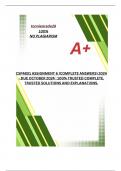, Question 1 Many psychologists believe that one of the most important stages
of cognitive development is symbolic play. You have been given a task to help
a group of parents to understand symbolic play. In ten (10) points, explain in
what way the quality of children’s symbolic play can have consequences on
the children’s later development. Include examples that are relevant to the
group of parents you are speaking to. Indicate the age of the learners that you
are referring to. (20)
1. Language Development
Explanation: During symbolic play, children often use words to represent objects or
actions (e.g., pretending a block is a car). This helps expand their vocabulary and
language skills.
Example: A 3-year-old pretending to have a tea party will use words like "cup," "pour,"
and "drink," which enhances their understanding and use of language.
2. Problem-Solving Skills
Explanation: Symbolic play allows children to create scenarios and solve problems
within their imaginary worlds, laying the foundation for advanced cognitive functions
like critical thinking.
Example: A 4-year-old building a castle out of blocks must figure out how to balance the
blocks to prevent the castle from falling.
3. Social Development
Explanation: Playing pretend with others helps children learn to negotiate, share, and
cooperate, which are essential social skills.
Example: A group of 5-year-olds playing "house" must assign roles (e.g., parent, child)
and work together to act out daily routines, fostering collaboration.
4. Emotional Regulation
Explanation: Symbolic play allows children to explore and express their emotions in a
safe environment, which helps them manage real-life emotions more effectively.
Example: A child who plays “doctor” and cares for a sick doll can express concerns or
fears about going to the doctor in real life, helping them process these feelings.
5. Imagination and Creativity
Explanation: Symbolic play encourages imagination, as children create and inhabit
worlds different from reality. This boosts creativity, which is valuable in many areas of
later life.




